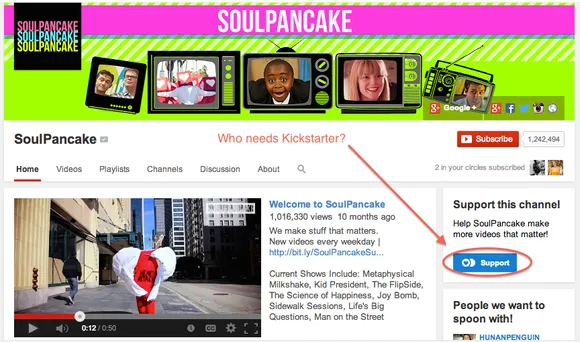How original video publishers can make more money on YouTube
The official Psy channel’s Gangnam Style video has generated over 2 billion views on YouTube. At an average CPM of $2, just this one video could have potentially generated $4 million in revenue for YouTube and Psy! How does revenue generation work on YouTube and what are the latest developments?
Video content is growing rapidly on the internet overall and on various social media in particular. The correlation with this growth can be seen with the proliferation of inexpensive smartphones with relatively good quality cameras. Further, easy Internet access via WiFi and 3G along with maturity of technologies such as video compression has made it all the more easy to capture, upload and share videos. In 2006, only 7% of 16- to 34-year-olds created online content, and that number has jumped to 77% today. YouTube, for long the mecca of online video has more than 100 hours of video uploaded every minute, more than 1 billion unique users visit each month and over 6 billion hours of video watched each month.
Till now, the major source of revenue generation for video creators was through digital ads – which play at the beginning or middle of clips, and the text ads that are displayed on top of video. As marketers are waking up to the possibilities of reaching their relevant audience via video, the amount of money being spent on digital video advertising is growing rapidly. In 2013, revenues from digital video ads on YouTube were estimated to be $4.2-4.7 billion (since Google does not break up the overall revenue numbers by division), with an expected growth to $6 billion, contributing nearly 7% of Google revenues. Taking into account the quality of the content online, the Internet giant is heavily investing in new features for its creator community, many of whom make a living off of their online personalities.
YouTube content creators made money from the digital advertisements flashing on their video channels with a revenue split of 55% for the publisher and 45% for Google. The amount of money made by the creator depend on the CPM (Cost Per 1000 views), CPC (Cost per click) and CTR (Click through rate). Advertisers spend on YouTube channels to reach an audience with defined demographic using proper keywords. There has been dissatisfaction among content publishers because of the high percentage of fees (45%) charged by Google over the years. For example, iTunes and Google Play Store charge 30% for apps published on those platforms. Google justifies the high fees because there is no competition in the online video market for YouTube (it’s in the top 5 sites of the world) unlike in the mobile app space.
However, Google has been trying to make changes to enable its content publishers to generate more money for themselves, thus keeping YouTube an attractive destination. It has provided various tools such as audience engagement features (comments, subscribers), custom channel branding, annotations & in video programming and YouTube Analytics. In the recent fifth VidCon gathering of thousands of creators and fans, YouTube unveiled a bunch of tools for improving their production. The new funding system is the biggest win of all for the creators, fans and investors. The "support" button beside a video for soliciting funds is like a virtual tip jar which will allow fans to contribute up to $500 to their specific channels through services like KickStarter, IndieGogo, Patreon and more, enabling an additional revenue generation mode.

Other announcements include:
- The rumours of YouTube clinching a deal with gaming- themed portal Twitch seems to be real after the launch of the 60 frames per second feature of YouTube. Now the creators can upload videos up to 60 frames per second with video speed similar to that seen in video games
- To track one's videos metrics, YouTube has launched the YouTube Creator Studio app for uploaders. It is now available on Android and will soon launch on iOS and following that a redesigned version of the app is expected to be launched on the desktop too
- Thousands of royalty-free sound effects for public use in different videos have been added with more tracks to the Audio Library
- Although the speech recognition and automatic translation feature is present on YouTube, users can now submit their translations in any language based on the subtitles or captions created
- YouTube is expected to launch its own weekly music countdown show "The YouTube 15" on SiriusXM next month. The show will be hosted by Jenna Marbles (a YouTube celebrity) featuring the biggest names and rising stars in music from YouTube which has a track record for launching hits without the help of radio
YouTube recently announced that users need to be logged into Google Plus to be able to comment on YouTube videos. This move was clearly a precursor to the announcements above, in a bid to provide more user information to video publishers. Clearly, Google is trying to reach out to its content publishers to enable them to generate more money and also to keep out other competitors such as Vimeo. However, with no other platform even close in terms of traffic, this might be enough to keep the publishers engaged. The monetization feature is currently not available for Indian users.
Read more about Google’s other plans for online domination here.







